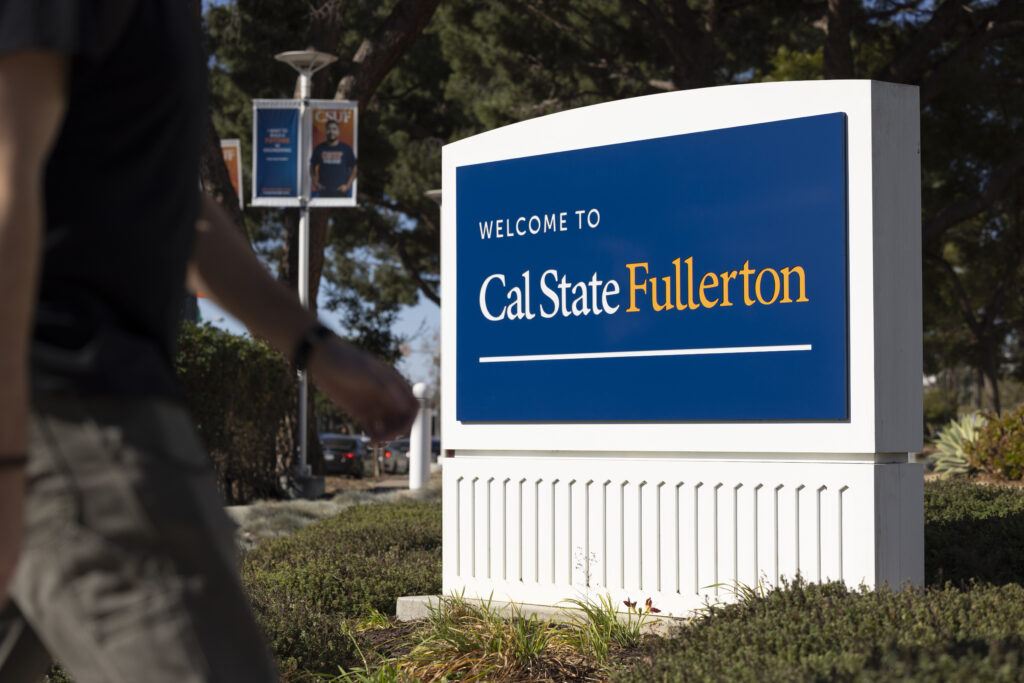
California State University, Fullerton
Credit: CSU Fullerton/Flickr
I have been a part of the Daily Titan staff since I was a freshman, and every week, we distribute a new print edition to City Hall, the public library and the police department.
The Fullerton City Council just made that illegal.
I’m in my second semester as editor-in-chief of the Daily Titan, Cal State Fullerton’s editorially independent student newspaper. I previously served on the paper’s editorial staff for two years.
On May 6, the Fullerton City Council voted 3-2 to reaffirm a policy that would ban nongovernmental publications from distribution on city property.
The council also voted to add a “community newspaper rack” to the library — a space that the Daily Titan can share with the community newspaper Fullerton Observer and any other entity that wishes to publish.
The best justification that City Council members provided for their decision-making was the potential for litigation from a local blog that had asked if it could distribute its papers on city property.
As editor-in-chief, I can’t help but interpret this as an attack on press freedom in Fullerton.
The Daily Titan regularly covers important items related to the city of Fullerton in addition to our campus coverage. In the past year, we’ve reported on a City Council candidate’s arrest, a parklet program that the city decided to eliminate despite public outcry, and the nearly $10 million deficit the city is staring down — to name a few.
I run a student paper, but my staff and I recognize the growing trend of news deserts — geographic areas with limited or no access to reliable, diverse and independent news.
Since Fullerton isn’t regularly covered by news outlets that meet that criteria, the Daily Titan steps up to help residents be informed. A growing number of college and high school newspapers across the country are doing the same thing.
And despite this setback with City Hall, we won’t stop doing our job.
The reporting of student journalists is now impacting communities like the local dailies of yesteryear, according to an article published in Poynter in April.
The article details how universities now build their curriculum around the notion that student journalism is more impactful than ever. Student journalists are stepping up and covering cities like paid reporters once did.
And while the Daily Titan doesn’t operate as a newswire service like the other university publications detailed in the article, we’re able to serve many of the same purposes.
The Daily Titan holds Fullerton city leaders accountable for their actions. Those same city leaders are making decisions as if we don’t matter.
At the April 1 council meeting, when the newspaper ban was first discussed, multiple City Council members used the term “free speech area” to describe where a proposed community newspaper rack would be in the library.
Their colloquial terminology for the proposed newspaper rack is laughable.
The mere notion that city property should have free speech restricted to a certain area is anti-democratic, and the lack of clear and just leadership from council members is disappointing. If we don’t like your policies, should we only sit at a certain table to discuss them?
Multiple City Council members — one who is also a professor at Cal State Fullerton — claim to support student journalism after the policy was enacted.
From my perspective, no, they don’t.
Supporting student journalism doesn’t mean breaking the status quo for an unclear reason.
Supporting student journalism doesn’t mean limiting the reach of important, unbiased news coverage.
Many student journalists first joined the Daily Titan to learn how to hold community leaders accountable through reporting and writing. The publication provides a platform for us to learn in a way we can’t in a classroom.
While we’re still doing that — and don’t plan to stop anytime soon — the Fullerton City Council succeeded in teaching us another lesson, a harsher one.
A lesson in how governments can work to suppress diverse voices.
A lesson in how student journalists can fall victim to petty City Council conflicts.
And a lesson that, given the Trump administration’s disdain for the press, is all too familiar.
Take the Associated Press (AP) for example: The wire service had to go to court to reinstate its ability to be admitted to White House press conferences after President Donald Trump didn’t like how AP refused to change a stylebook entry for the Gulf of Mexico.
As journalists, we can continue to fight for our right to exist. It’s a jarring reality that litigation might be the most effective way to accomplish that.
What citizens can do is pay attention to the City Council and think critically about its actions. And remember what’s happened in the past four years the next time they vote.
Remember that journalism needs to be protected and uplifted to support a free and fair democracy.
Not pushed to the back of the library.
•••
Emily Wilson is a journalism student at California State University, Fullerton, editor-in-chief of the university paper, the Daily Titan, and a member of EdSource’s California Student Journalism Corps.
The opinions expressed in this commentary represent those of the author. EdSource welcomes commentaries representing diverse points of view. If you would like to submit a commentary, please review our guidelines and contact us.

دیدگاهتان را بنویسید